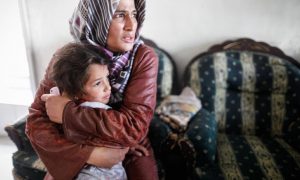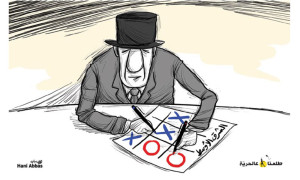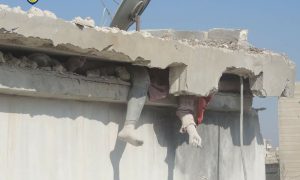Ibaa’ Monzer
September 10th, 2016
Nothing will go back to the way it was five years ago. This is a certainty of a war that has changed all the components and characteristics of Syria, including the status and role of women.
“I waited for them to become men and support me when I’m old but they left without farewell” Om Ahmad (50) said, her voice giving away her exhaustion from raising and supporting her grandchildren and two daughters in their country of displacement.
“Two years ago my three sons left and never came back” She added. “I know nothing about them.” Om Ahmad lives in a modest room she rents in Lebanon with 7 other people, 3 of them children. Her family is one of 144 thousand Syrian families who lost their breadwinners in the past five years, according to the Syrian revolution statistics.
Figures and Connotations
The same source cites 151,685 male martyrs documented by name, in addition to 114,960 detained and 109,535 missing. As the war continues, the number of people leaving the country multiplies. According to the Syrian Network for Human Rights there are now 5,835,000 Syrian refugees, more than 50% of them children, 35% women, and 15% men.
This means there are more than 2 million women -35% of total refugees- who left Syria looking for a new life, some from conservative societies. As the numbers indicate, securing income for many families now lies on the shoulders of women, once making up no more than 12.9% of the total workforce in Syria before the revolution according to the census bureau in 2010. This number does not include undocumented workers or farm workers in the countryside.
It is, therefore, a battle of endurance and survival that was forced upon women, and some of them have won that battle. Many left Syria alone with their children to get to safer places even though they used to live in conservative communities where such journeys would have been an impossible undertaking just five years ago.
Trading Places
“Salma” is is one of the women who smuggled herself and her two children into France, braving the dangers of the journey alone while her husband back home awaits to be reunited with his family once she is granted a residence permit.
“Rahaf”, a college graduate and the only sister to 3 brothers, was banned by her brothers from leaving the house alone. Things changed, however, after 3 treacherous journeys of displacement inside Syria and one deteriorating financial situation, afterwhich she braved the journey as a refugee alone to Lebanon, then to Turkey where she now lives and works. She sends her family money regularly and will soon be married to a young man from the Syrian diaspora. Her family somewhat accepted her situation, turning what was once impossible into a given reality praised by both parents and one of the three brothers.
The giggle of the woman who divorced her husband in Europe still echoes in my ears. She said she didn’t love him and left him the moment they reached a country that respected women’s rights.
Despite all the blatant violations that women experience across the board, and especially during war, they don’t hesitate to take matters into their own hands as soon as they break free of their societal restraints.
Antipodal Models
It is no longer possible to assess the situation of women inside Syria in a general sense because of the deepening social and political chasms. Some areas in Syria pushed women into increased obscurity and marginalization, while circumstances in other areas catapulted them into the thick of life, forcing them to fend for themselves and their children. As a result, their self confidence soared and they gained new skills and experiences that cannot be unwound.
Though some positive examples of women’s independence and rights are evident outside Syria, in many other cases the status quo has not changed as those social shifts remain contingent upon both woman’s and man’s acceptance. The only thing that changed for many Syrian families who went to Europe is their place of residence, as both men and women cling tighter to beliefs they think are their path to salvation in a “foreign” society that they consider to be depraved.
“Safaa” -who came to France with her husband and children- says: “My husband was more forgiving in Syria regarding how I dress, where I go, and in child rearing. But since we got here he became more strict out of fear of us adopting the new culture’s beliefs”. Safaa’ does not shy away from expressing her annoyance and disapproval of this unnecessary austerity, but she made peace with it as she doesn’t think she can change her husband’s view of their new society.
Betting on An Uncertain Future
Women will face an unusual test as they struggle to cope with living between two polar opposites: Centuries-old social sediments versus an objective reality imposed by revolution and displacement. It stands to reason that we do not draw conclusions based on such a short period of time. It is also hard to gauge women’s ability to adapt and leave their cocoons to bring about deep-rooted change.
This new task for women (inside and outside of Syria) joins a host of other tasks that they perform in a society known to dwell on gender roles. In many instances, objective circumstances of the war gradually pushed back the role of men, creating a void for women to fill.
It may be a heavy burden on women, but it is sure to deliver them more financial independence. And the question remains: Will this eventually break the social shackles that have been slapped on over the years and bring about profound change to women’s status in society?
Translated by Dima Alghazzy





















